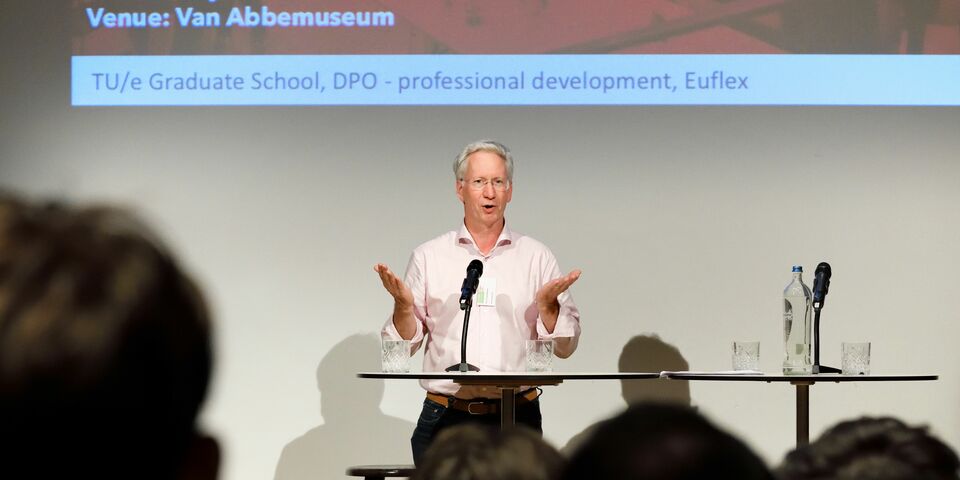“Housing plays a crucial role in upscaling”
Plans for a massive upscaling at TU/e, recently issued by a think tank, focus explicitly on a significant growth in the number of master’s programs, EngD-trainees and PhD candidates. These groups fall within dean Paul Koenraad’s Graduate School. He too sees possibilities for growth, but he is clear about one thing: “Without sufficient housing, such a massive upscaling will never be achieved.”
Paul Koenraad says that he met with the think tank and its chair, Maarten Steinbuch, on a previous occasion to discuss the massive upscaling and all the required conditions. “The deans and my fellow dean of the Bachelor College, Ines Lopes Arteaga, were also present during that meeting. Their first draft contains some fine ideas, it’s a good document with which to launch the discussion about the topic of ‘growth’ within our institution.”
Aiming for growth within the master’s programs is one option Koenraad agrees with: “That’s where you achieve the quickest results, because you can prepare students, including those transferring from other fields, for the labor market within two years.” In order to realize that growth, TU/e will need to focus mostly on recruiting students from abroad, Koenraad says. “That’s why we need to drastically intensify and focus our recruitment activities. In addition, we need to identify the domains within which we want to achieve growth, because not all programs need to grow at the same pace.”
Transfer
“It’s also important that we increase the number of internationals who decide to transfer to a master’s program after they completed their bachelor’s program at TU/e,” Koenraad says. “Currently, that group leaves too soon, which is why we need to ask ourselves – and we already do so – what we can do to keep them here. Because many of these students already have a place to live, and they know their way around the university. We are currently investigating whether there are any additional possibilities to make them eligible for our ALSP scholarships (which consists of a partially tuition fee waiver and a contribution to living expenses, ed.).”
There seems to be a small decline in intake numbers for the master’s program this academic year, from 1610 to 1370, according to figures from TU/e’s BI Portal. Isn’t Koenraad worried about that? “I first want to wait for the 1 October census, because I expect that the number of master’s student will increase somewhat. Something similar happened at the pre-masters. Just one month ago, we expected no more than a hundred students, but that number has now climbed to approximately 175.”
Several factors come into play with regard to the intake numbers for TU/e’s master’s programs, the dean says. “It’s true that Covid is gone, but we’re still experiencing the aftermath of the pandemic. We tightened up the entry requirements for our master’s programs somewhat a few years back, and that too resulted in a drop in intake numbers. But the most important factor today is housing. In the current situation, we send internationals who plan to come to TU/e an email with the advice not to travel to Eindhoven if they haven’t found an accommodation yet. It’s crucial that we realize new housing, because without it, we will never achieve that massive upscaling. The two residential towers for students on our campus scheduled for completion in 2024 will certainly help, but it isn’t nearly enough.”
Facilities
Additional housing is just one of the things the university needs to realize if it wants to cope with an increase in the number of master’s students, Koenraad, says. An expansion of the academic staff and TU/e’s research facilities are equally important. “Master’s students need to be able to carry out their research in labs at facilities here on campus, and they need to be supervised. They could perhaps carry out their graduation assignment at a company. But we’ve learned from experience that this doesn’t reduce the number of hours a supervisor spends supervising a project, in fact, it makes no difference at all in certain cases.” An increase in the number of staff members and an expansion of TU/e’s facilities will in any event ensure a growth in the number of PhD candidates, Koenraad says.
Koenraad agrees with the think tank’s assessment that it sees possibilities for growth among the technological designers, or EngD-trainees. However, a smile appears on his face when he’s confronted with the think tank’s ambition to realize a growth of somewhere between one and two thousand designers. Currently, that number is approximately 250. “We need to make it even clearer to industry that an EngD-trainee has more experience and knowledge than a graduated master’s student. We’ve appointed someone at a central level whose job it is to visit companies on a regular basis to convey this message. That has already resulted in twelve new projects at companies. In addition, we want to adopt a more project-based approach. We choose a topic, after which a number of technological designers and several companies with an interest in that topic collaborate. We will also look into the possibilities of applying for external grants for these projects.”
Means
The financial means the think tank and the Executive Board ask for in advance to realize all these plans, shouldn’t just come from The Hague, but from Europe as well, according to Koenraad. “The money we want to spend on education should come mostly from the Netherlands, but we should turn to Europe for the money we want to spend on extra research.”
And what sums is he thinking about? Koenraad is very clear about that: “That isn’t so difficult. If we want to double our student numbers we need to recruit more staff members, on both the scientific and support staff, and we need to build extra facilities. That means that the government’s contribution should double as well, meaning an additional 280 million euros annually. I don’t see that happening any time soon,” he says with a smile.


Discussion